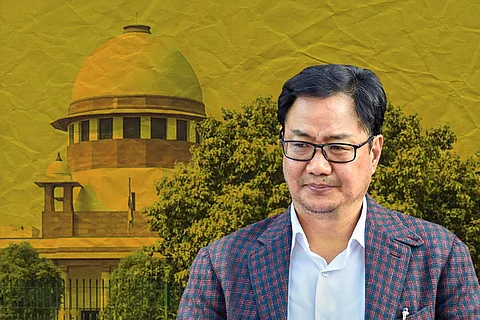

The Supreme Court on Monday, November 28, took strong exception to Law Minister Kiren Rijiju's recent comment on the collegium system of appointing judges, saying it should not have happened. The apex court said the recommendations were withheld since the law passed by the union government on setting up the National Judicial Appointment Commission (NJAC) could not pass muster.
A bench comprising justices Sanjay Kishan Kaul and A S Oka said, "When someone in a high position says that...it should not have happened...". The apex court clarified that once the recommendation has been reiterated, the names have to be cleared.
Law Minister Rijiju had recently launched a fresh attack on the mechanism to appoint Supreme Court and high court judges, saying the collegium system is "alien" to the Constitution. The Supreme Court in its wisdom, through a court ruling, created collegium, he said, noting that before 1991 all judges were appointed by the government.
Speaking at the Times Now Summit in New Delhi, the minister said the Constitution of India is a "religious document" for everyone, especially the government. "Anything which is alien to the Constitution merely because of the decision taken by the courts or some judges, how do you expect that the decision will be backed by the country," he asked.
Rijiju said the collegium system is alien to our Constitution. "You tell me under which provision the collegium system has been prescribed," he asked. He explained that once the Supreme Court or a high court collegium sends recommendation, the government has to do due diligence.
Rijiju was responding to a question on government "sitting" on various Supreme Court collegium recommendations at a time when cases are piling up in courts. But at the same time, the minister said the government of the day in 1991 and the present regime "very well respect the collegium system until or unless it is replaced by a better system".
Senior advocate Vikas Singh brought to the notice of the court Law Minister Rijiju's interview to a TV channel, where he had said, "Never say that the government is sitting on the files, then don't send the files to the government, you appoint yourself, you run the show then".
Justice Kaul told the Attorney General R Venkataramani, representing the union government, "I have ignored all press reports, but this has come from somebody high enough……." He added, "I am not saying anything else. If we have to, we will take a decision". The bench said, "We have expressed our anguish. It appears that the government is not happy that the NJAC has not passed the muster".
It further queried the union government’s counsel, "Can that be the reason to not clear the names”. The bench said, "Please resolve this and don't make us take a judicial decision in this regards,” and added that the whole process for appointment of judges already takes time.
The bench said the Intelligence Bureau inputs are taken and also the union government’s inputs are taken, and then the apex court collegium considers these inputs and sends the name.
The bench asked the AG and Solicitor General to convey the "sentiments of the bench" to the government and ensure that the law of the land is followed. After hearing arguments, the bench scheduled the matter for further hearing on December 8.
On November 11, the Supreme Court expressed its strong discontent over delay in appointment of judges, saying, "needless to say that unless the bench is adorned by competent lawyers the very concept of rule of law and justice suffers".
A bench comprising justices Sanjay Kishan Kaul and Abhay S Oka said: "If we look at the position of pending cases for consideration, there are 11 cases pending with the Government which were cleared by the Collegium and yet are awaiting appointments. The oldest of them is of vintage September 4, 2021 as the date of dispatch and the last two on September 13, 2022. This implies that the government neither appoints the persons nor communicates its reservation, if any, on the names".
It added there are also 10 names pending with the government which have been reiterated by the Supreme Court collegium starting from September 4, 2021 to July 18, 2022.
The top court passed the order on the contempt plea filed by The Advocates Association Bengaluru through advocate Pai Amit. The plea said the union government has not complied with the directions of the apex court in connection with the time schedule set for the appointment of judges.
He said he will not get into the debate of what that system should be. "That requires a better platform or a better situation."
With near unanimity, Parliament had passed the National Judicial Appointments Commission (NJAC) Act to overturn the collegium system. But the law was struck down by the Supreme Court.
Rijiju said as long as the collegium system is prevailing, he has to respect the system. "But if you expect the government should merely sign (on) the name to be appointed as a judge just because it is recommended by the collegium, what is the role of government then? What does the word due diligence mean," he argued.
He said there are loopholes in the collegium system and "people are raising voices" that the system is not transparent. "Also there is no accountability," he added.
Before describing the collegium system as alien to the Constitution, Rijiju said every judge is not right. "But every judgement is correct and right because it is a judicial pronouncement. In a democratic process, nobody can disrespect the judiciary and nobody can disobey a court order," he said.